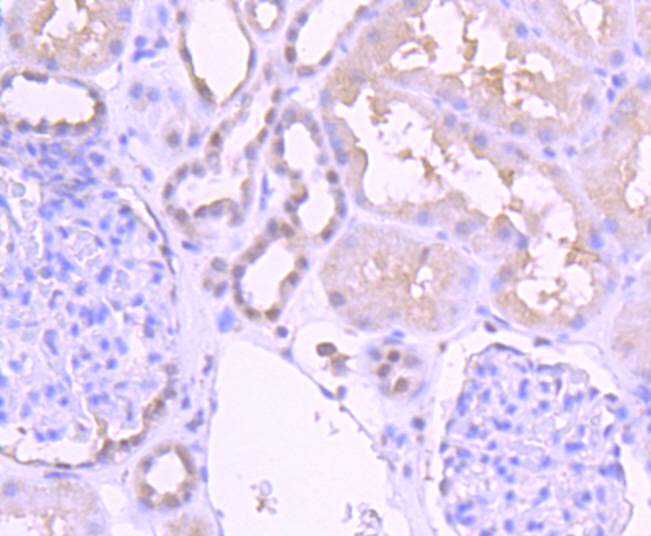Product Detail
Product NamePax2 Rabbit mAb
Clone No.JJ082-08
Host SpeciesRecombinant Rabbit
Clonality Monoclonal
PurificationProA affinity purified
ApplicationsWB, IHC
Species ReactivityHu
Immunogen Descrecombinant protein
ConjugateUnconjugated
Other NamesFSGS7 antibody Paired box 2 antibody Paired box gene 2 antibody paired box homeotic gene 2 antibody paired box protein 2 antibody Paired box protein Pax 2 antibody Paired box protein Pax-2 antibody Paired box protein Pax2 antibody PAPRS antibody Pax 2 antibody
Accession NoSwiss-Prot#:Q02962
Uniprot
Q02962
Gene ID
5076;
Calculated MW45 kDa
Formulation1*TBS (pH7.4), 1%BSA, 40%Glycerol. Preservative: 0.05% Sodium Azide.
StorageStore at -20˚C
Application Details
WB: 1:1,000
IHC: 1:50-1:100
Immunohistochemical analysis of paraffin-embedded human kidney tissue using anti-Pax2 antibody. Counter stained with hematoxylin.
Pax genes contain paired domains with strong homology to genes in Drosophila which are involved in programming early development. The PAX2 gene is expressed in primitive cells of the kidney, ureter, eye, ear, and central nervous system. More specifically, in human embryo sections, PAX2 is expressed in the optic vesicle and later in the retina, in the otic vesicle and later in the semicircular canals of the inner ear, and in mesonephros, metanephros, adrenals, spinal cord, and hindbrain. PAX2 mutations can be responsible for renal hypoplasia, either isolated or associated with various ophthalmologic manifestations ranging from retinal coloboma to microphthalmia. Lesions in the PAX6 gene accounts for most cases of aniridia, a congenital malformation of the eye, chiefly characterized by iris hypoplasia, which can cause blindness. PAX6 is involved in other anterior segment malformations besides aniridia, such as Peters anomaly, a major error in the embryonic development of the eye with corneal clouding with variable iridolenticulocorneal adhesions.
If you have published an article using product 49231, please notify us so that we can cite your literature.



 Yes
Yes



